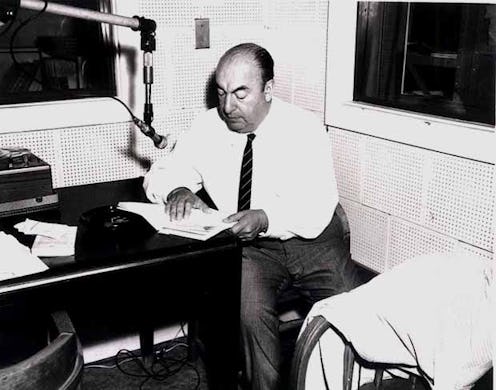When the weather begins hovering on the cusp between spring and summer - that's the perfect season to read some Pablo Neruda. What luck, then, that the Nobel-winning Chilean poet, known for his achingly beautiful takes on love, is releasing new work later this month. Yep, that's right, there's some new Pablo Neruda in town.
Then Come Back: The Lost Neruda Poems, set to be released later this month in the UK, is a collection of 21 recently discovered poems, found scribbled on the backs of menus, in the margins of books, and on the edges of napkins - as if Neruda couldn't get any more romantic.
The works, penned between 1950 and 1974, were discovered in 2014 by the Neruda Foundation, during their archiving of Neruda's papers. Bloodaxe Books, a British poetry imprint, has since acquired the rights from Fundacion Neruda, which benefits the heirs to the Neruda name. Then Come Back will join 20 other translated Neruda works.
Pablo Neruda, born Ricardo Eliecer Neftali Reyes Basoalto, was a poet-diplomat and politician, with strong ties to the Chilean Communist Party. He began writing poems as a child, and if this latest collection is any indication, he never stopped.
Don't worry, the dual-language collection (Spanish and English, translated by Forrest Gander), will include color photos of the original, handwritten pieces, in all their hidden, scattered, thoroughly charming glory, along with detailed notes regarding where they were found and how they relate to his larger body of work. There's been no mention of whether Neruda's famous green ink, his favorite color to write in, will be visible.
Yes, I'm freaking out, too. Yes, I'm also wondering who I know in the UK who can send me a copy.
According to translator Gander, not all the poems are finished. They include odes, anecdotes, and meditations on love and political engagement. Some are typed and corrected in Neruda's hand; others end in commas, some float on scraps on paper and across theater programs. But regardless of their state, or perhaps because of it, folks are eager for this latest collection to take its place in Neruda's prolific legacy.
